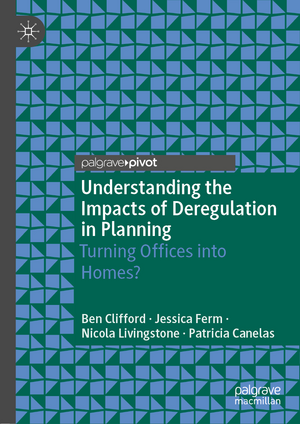Understanding the Impacts of Deregulation in Planning: Turning Offices into Homes?
Autor Ben Clifford, Jessica Ferm, Nicola Livingstone, Patricia Canelasen Limba Engleză Hardback – 18 apr 2019
In England, it has been possible since 2013 to convert an office building into residential use without needing planning permission (as has been required since 1948). This book explores the consequences of this central government driven deregulation on local communities. The policy decision was primarily about boosting the supply of housing, but reflects a broader neoliberal ideology which seeks to reform public planning in many countries to reduce perceived interference in free markets. Drawing on original research in the English local authorities of Camden, Croydon, Leeds, Leicester and Reading, the book provides a case study of the implementation of planning deregulation which demonstrates the lowering of standards in housing quality, the reduced ability of the local state to proactively steer development and plan for their places, and the transfer of wealth from the public to private spheres that has resulted. Comparative case studies from Glasgow and Rotterdam call into question the very need for the deregulation in the first place.
Preț: 389.11 lei
Nou
Puncte Express: 584
Preț estimativ în valută:
74.46€ • 77.59$ • 61.65£
74.46€ • 77.59$ • 61.65£
Carte tipărită la comandă
Livrare economică 03-17 aprilie
Preluare comenzi: 021 569.72.76
Specificații
ISBN-13: 9783030126711
ISBN-10: 3030126714
Pagini: 132
Ilustrații: XVIII, 225 p. 28 illus., 27 illus. in color.
Dimensiuni: 148 x 210 mm
Greutate: 0.44 kg
Ediția:1st ed. 2019
Editura: Springer International Publishing
Colecția Palgrave Pivot
Locul publicării:Cham, Switzerland
ISBN-10: 3030126714
Pagini: 132
Ilustrații: XVIII, 225 p. 28 illus., 27 illus. in color.
Dimensiuni: 148 x 210 mm
Greutate: 0.44 kg
Ediția:1st ed. 2019
Editura: Springer International Publishing
Colecția Palgrave Pivot
Locul publicării:Cham, Switzerland
Cuprins
Chapter 1 The rise and rise of permitted development in England.- Chapter 2 Deregulation, neoliberalism and the planning system.- Chapter 3 The planning context for office-to-residential change of use.- Chapter 4 Understanding office-to-residential permitted development.- Chapter 5 Overview of office-to-residential conversion in England and our case studies.- Chapter 6 The Camden story: threatening the creative economy?.- Chapter 7 The Croydon story: slums of the future?.- Chapter 8 The Leeds story: city centre students and industrial estate living.- Chapter 9 The Leicester story: positive reuse or threatening an emerging private rental sector?.- Chapter 10 The Reading story: loss of affordable housing in the vibrant South East?.- Chapter 11 Alternative approaches to governing change of use: Scotland and the Netherlands.- Chapter 12 Conclusions and implications for future practice.
Notă biografică
Ben Clifford is Senior Lecturer in Planning at the Bartlett School of Planning, UCL, UK. Ben’s research focusses on the relationship between planning reform and the modernisation of the state in the UK and he was lead author for the book The Collaborating Planner?
Patricia Canelas is an architect and urban planner. Prior to her academic work, Patricia worked in practice. She is currently a researcher at ISCTE-IUL, Lisbon, Portugal. Her research interests span the themes of urban governance, property markets and place-making.
Jessica Ferm is Lecturer in Planning at the Bartlett School of Planning, UCL, UK. Her research focuses on the intersection of spatial planning with the economy and she has published on planning for workspace and industry. Having worked in practice, she is co-editor of the book Planning Practice.
Nicola Livingstone is Lecturer in Real Estate at the BartlettSchool of Planning, UCL, UK. Her research interests include real estate investment, the evolution of the retail market, food insecurity and interpreting the social form of the built environment.
Textul de pe ultima copertă
In England, it has been possible since 2013 to convert an office building into residential use without needing planning permission (as has been required since 1948). This book explores the consequences of this central government driven deregulation on local communities. The policy decision was primarily about boosting the supply of housing, but reflects a broader neoliberal ideology which seeks to reform public planning in many countries to reduce perceived interference in free markets. Drawing on original research in the English local authorities of Camden, Croydon, Leeds, Leicester and Reading, the book provides a case study of the implementation of planning deregulation which demonstrates the lowering of standards in housing quality, the reduced ability of the local state to proactively steer development and plan for their places, and the transfer of wealth from the public to private spheres that has resulted. Comparative case studies from Glasgow and Rotterdam call into question the very need for the deregulation in the first place.
Ben Clifford is Senior Lecturer in Planning at the Bartlett School of Planning, UCL, UK. Ben’s research focusses on the relationship between planning reform and the modernisation of the state in the UK and he was lead author for the book The Collaborating Planner?
Patricia Canelas is an architect and urban planner. Prior to her academic work, Patricia worked in practice. She is currently a researcher at ISCTE-IUL, Lisbon, Portugal. Her research interests span the themes of urban governance, property markets and place-making.
Jessica Ferm is Lecturer in Planning at the Bartlett School of Planning, UCL, UK. Her research focuses on the intersection of spatial planning with the economy and she has published on planning for workspace and industry. Having worked in practice, she is co-editor of the book Planning Practice.
Nicola Livingstone is Lecturer in Real Estate at the Bartlett School of Planning, UCL, UK. Her research interests include real estate investment, the evolution of the retail market, food insecurity and interpreting the social form of the built environment.
Caracteristici
Examines through detailed case studies the implications of making office-to-residential conversion permitted development in England Develops existing work on this deregulatory reform using original research data Argues that this example of the broader neoliberal trend for planning deregulation has led to generally lower standards and worse public finances
